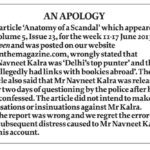Manmohan’s India
It’s a question India’s Prime Minister asked a long time ago when he first embarked on his political journey. Now, in his latest effort to lead the country in keeping with his long-term vision, he may well want to ask it again: who fails if India wins?
 Hartosh Singh Bal
Hartosh Singh Bal
 Hartosh Singh Bal
|
06 Aug, 2009
Hartosh Singh Bal
|
06 Aug, 2009
/wp-content/uploads/2015/11/manmohan-vision.jpg)
Make no mistake: it’s no bits-and-pieces politician in the PM’s chair; it’s a statesman pushing India in an irrevocable policy direction.
Make no mistake: it’s no bits-and-pieces politician in the PM’s chair; it’s a statesman pushing India in an irrevocable policy direction.
When Manmohan Singh became Prime Minister in 2004, there was no shortage of journalists headed for Oxford. He had, after all, enrolled for a DPhil in economics at Nuffield College at the university between 1960 and 1962. Ian Little, who was Singh’s supervisor, was widely quoted saying he was “fairly surprised about his taking over as the prime minister”. His assessment: “When he was here, he was very quiet. Not the sort who make great politicians.” In Delhi, when reporters from Time, including a then not quite so famous Aravind Adiga, interviewed Singh, their first question was, “Are you really the Prime Minister?”
Five years later, Manmohan Singh became the first Indian PM after Jawaharlal Nehru to assume the post for a consecutive term after completing a full five years in office.
Not once, but several times over, whether it was when he took over as Finance Minister in 1991, or when he ensured the signing of the Indo-US Nuclear Deal, Manmohan Singh has confounded expectations. Now, in the aftermath of the joint Indo-Pak statement at Sharm el-Sheikh, far too much has been said about the short-term impact. More important is the fact that Manmohan Singh has a long-term vision. He has already changed the economic contours of the country, he has brought about a significant realignment of its foreign policy, and he has now set himself the goal of improving relations between India and Pakistan.
Ramachandra Guha, a historian of contemporary India, sees an echo of the last days of Nehru in this current obsession: “In the 1950s, Nehru did not concern himself much with Pakistan, but in the 1960s he became obsessed with the idea of peace with Pakistan. He released Sheikh Abdullah and articulated a position much the same as Manmohan Singh is articulating now—we have no choice in the matter of our neighbours. These are our neighbours, we have to deal with them. The logic is irrefutable.”
But intent, as Guha says, is never enough—“There are two key issues, one is the idea, and the other is the ability to carry it out. Manmohan Singh’s ability to act on ideas is hampered by the lack of political backing within the party and in the general public.”
This is a handicap Singh has already overcome once. On 18 July 2005, in the company of then US President George W Bush, he put in place the framework for the Indo-US Nuclear Deal. It took more than three years to finalise, with the Left threatening to bring down his Government on several occasions. In the end, the Government survived, and the deal became a reality. One upshot is that it is difficult to persist with the argument that he is short on political instinct.
THE PAST
Manmohan Singh was born in what was once West Punjab and is now Pakistan. “He has a very strong sense of history and deep intellectual grasp of it as well,” says his elder daughter Upinder Singh, a historian, speaking to Open, “Two events that made a big impact on him as a child were—the horrors of Partition and communal violence (his grandfather was killed and his family re-located), and in the pre-Partition days he remembers seeing dead bodies lying on the road as he made his way to school in Peshawar. The second event that shocked him greatly was the assassination of Gandhiji.”
It speaks for his reticence that he has never spoken of these events other than in very general terms. Three years ago, he commented on the irony that “President Musharraf was born here, I was born on the other side of the border.” It led him to state, “And my vision is to wait for the relationship between India and Pakistan… it will be like relations between Canada and the United States. We want Pakistan to flourish as a modern Islamic state. That is in India’s interest, that is in the interests of the world as a whole.”
Given this background, nothing he said in Parliament on 29 July after the Sharm el-Sheikh visit was really new. Manmohan Singh has stated it often enough with clear intent. Far too often, Upinder Singh admits, his gentleness continues to be mistaken for pliability. But he is no longer just the academic bureaucrat he once was, when he took over as FM in 1991. He not only changed the country, he changed himself.
ACADEMIC BUREAUCRAT
Manmohan Singh’s career as an economist had begun decades ago while in school. In an interview, he recalled, “As a thinking student of 15-16 years, I was troubled by the grim poverty that I saw around me. And there’s one book written by a very famous author in our country, Minoo Masani. It was entitled Our India. It was in our school texts. And the first sentence in that book was, ‘One man in every five is an Indian’. And yet, it concluded India happens to be a rich country inhabited by very poor people. To understand factors, why India is such a poor country, why there is so much misery, why there is so much poverty, that is what led me to the study of economics.”
A series of scholarships saw him reach Oxford, where he began working on a thesis against Nehru’s inward-looking economic policies. It led to a book: India’s Export Trends and Prospects for Self-Sustained Growth, when he returned to teach at Panjab University, Chandigarh.
Agricultural economist HS Shergill was a student of his at the university. “He spoke sparingly,” he recalls, “just answering questions related to economics.” Shergill, a young man from a Punjab village, was looking for more than academic guidance, but, “Even though we were invited to his home, the interaction never went beyond economics. What always surprised me was the fact that he showed no signs of emotional bonding even with his colleagues.”
This trait has been observed over and over. Whether working with the UN, the Government or even teaching economics, colleagues recall him as a good listener, as someone “willing to pay attention to even a child but always keeping his own counsel, not given to small talk”.
In Punjabi culture, where animated discussions over coffee in the afternoon or whisky at night were the norm, he stood apart. All the while, he continued to work with characteristic diligence, even while divorced from the dogma of central planning that dominated both the bureaucracy and academia.
This has led many to charge him with concealing his ideas for the sake of his career. His thesis, though, is evidence enough that his views were no secret. Manmohan Singh himself has said, “When I came to the Finance Ministry in 1971, I wrote a paper called ‘What To Do With Victory’. I had written at the time that all the controls in the name of socialism would not lead to growth but would strangle the impulses of growth. I had said that these controls would not reduce inequalities but increase them. I have not been timid. I have spoken my mind freely and frankly. But I’ve also served as a faithful civil servant. Even if I have been overruled, I have carried out the orders of my political masters.”
LIBERALISATION
The reforms of 1991 freed not just the economy but also the faithful civil servant. The country’s economy was floundering when he was asked by Prime Minister Narasimha Rao to take charge as Finance Minister. People close to him were telling him he would be the fall guy, likely to be kicked out within six months.
Years later, Singh recounted his response, “And I said I was the Fagin of my peers. I’d held all the top civil service jobs, but here was an opportunity to play a political role, and there was an odd chance that we would make a success of it, in which case I would have a footnote in India’s history. If I fail, that’s of no great consequence. And who fails if India wins?”
Even his critics would have balked at that comparison with Fagin. A Dickensian character who lives off the earnings of a gang of young pickpockets hardly describes Manmohan Singh, but clearly the parallel between bureaucrats and a bloodsucker is an indication that somewhere within him, after decades of playing the role of a pliant bureaucrat, there was a sense of dissatisfaction with what he had achieved.
As Finance Minister, this quickly became a thing of the past: “I said to the country on the day I became Finance Minister that the economy was in such bad shape that you shouldn’t expect any major rewards for the next three years. All I can promise is blood, sweat, and tears. But quite frankly, I think that the economy turned around much sooner, much quicker, and much more deeply than I had anticipated. That’s why our critics were completely silenced.”
A NEW EQUATION
Manmohan Singh’s success as Finance Minister not only made his reputation, it also forged the relationship that has been crucial to his political success. In July 1991, he had presented his first Union Budget. Among the provisions was a Rs 100 crore grant for the Rajiv Gandhi Foundation. The uproar at the impropriety of this, the Government funding a private trust, was immediate. It was also the last thing Sonia Gandhi would have wanted in the aftermath of her husband’s death. Manmohan Singh was sent by Narasimha Rao to 10 Janpath, her New Delhi residence, to make amends.
A nervous Manmohan Singh sat through the audience with Sonia Gandhi unsure of where to begin. Hesitantly, after tea was served, he brought up the topic, explaining that it had never been the Government’s intention to embarrass her. Together, they came up with a way to defuse the crisis. Sonia Gandhi wrote a letter to Rao declining the grant but thanking the Government for the gesture. The furore subsided.
Since then, a reticent Sonia Gandhi has worked out a level of comfort with Manmohan Singh. The same reserve and circumspection that colleagues had once found exasperating now stand him in good stead. The terms of their professional interaction are well marked out. This is something senior Congress leaders have learnt to their chagrin. At the beginning of his tenure as PM, many of them were given to visiting the Congress chief and listing out how and why the way the Government was being run would reflect badly on her. Soon enough, they realised that he takes her into confidence at each important step.
This is achieved through a simple arrangement that cuts out any possibility of misunderstanding. They meet as and when necessary. The meetings are one on one, no notes are taken, no one else is privy to what transpires. He understands his limits and does not interfere in party matters. She understands that there are certain issues that he sees as key to his prime ministerial legacy, and he is unlikely to compromise on those.
On his return to Delhi from Sharm el-Sheikh, the first thing Manmohan Singh did was set up a meeting with Sonia Gandhi. Observers have interpreted her subsequent extended public silence in various ways, but they forget the striking parallel between this controversy and what ensued after the PM gave an interview to The Telegraph asking the Left to fall in line over the Nuclear Deal. Her silence then was seen as an indictment and the PM was forced to say that failure to carry the deal through “is not the end of life”. After Sharm el-Sheikh too, critics have rushed to leave the PM’s initiative for dead.
The Nuclear Deal, as we now know, was eventually signed. This is reason enough to suspect that he means every word of what he said in Parliament on 29 July 2009: “Our objective, as I said at the outset, must be a permanent peace with Pakistan, where we are bound together by a shared future and common prosperity.” The statement was endorsed by Sonia Gandhi the very next day.
PITFALLS
The equation, though, has not always worked to the PM’s advantage. In comparison with his last term in office, he finds his space for manoeuvre on foreign policy slightly constrained. After the 2009 electoral victory, senior members of the Congress afraid of the PM’s growing influence backed old-timer Pranab Mukherjee for Finance Minister. This left a vacuum at the Foreign Ministry, which has since been filled by the well-meaning but inexperienced
SM Krishna. Another crucial blow has been the departure of his media advisor Sanjaya Baru, one of the few whose loyalty lay with Manmohan Singh rather than the party. His replacement Harish Khare is a party appointee. After Sharm el-Sheikh, this change was reflected in the lack of clarity from the PMO, something that had not happened even at the peak of the political crisis over the Nuclear Deal.
But these details are minor compared to what could transpire across the border. There is enough indication that Pakistan’s current government is serious about negotiating peace, but domestic compulsions mean that its crackdown on terror will be partial at best. There is reason enough to fear another terror attack. As much as Pakistan’s leadership, the Indian Prime Minister realises that his Government has a role to play in preventing this possibility. “In the final analysis,” Manmohan Singh told Parliament, “the reality is that, despite all the friends we have… when it comes to matters relating to our national security and defence, we will have to depend on ourselves. Self-help is the best help.”
Yet, despite possible pitfalls, even those who have no liking for the reality of Pakistan speak of a window of opportunity. “Pakistan is the repudiation of a thousand years of Indian history, it is an abomination created by the efforts of a third-rate English Viceroy,” says Wajahat Habibullah, now Chief Information Commissioner, who has spent much of his career as an IAS officer in Kashmir, “We must come to terms with Pakistan, but we must never accept the idea of Pakistan. Nonetheless, a window of opportunity has just opened. Pakistan has an elected government, the Obama administration is focused on this region, and Jammu & Kashmir has a popularly elected government. These are the ideal conditions under which a lasting solution can be found, but they won’t last very long.”
Manmohan Singh knows this only too well. He has often quoted John Keynes in his defence: “When the facts change, I change my mind.” For the moment, the facts are in keeping with his mind, but that could change soon.

/wp-content/uploads/2024/12/Cover_Double-Issue-Spl.jpg)











More Columns
The Heart Has No Shape the Hands Can’t Take Sharanya Manivannan
Beware the Digital Arrest Madhavankutty Pillai
The Music of Our Lives Kaveree Bamzai